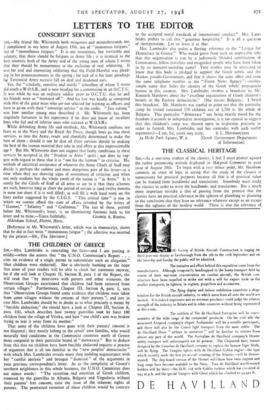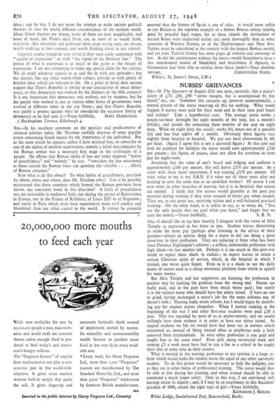THE CLASSICAL HERITAGE
SIR,—As a one-time student of the classics, I feel I must protest against the rather patronising attitude displayed in Marginal Comment in your issue of August 20th. To begin with a very minor point, Mr. Nicolson, commits an error of logic in saying that the study of the classics is unnecessary for practical purposes because all that is of practical value can be learned from handbooks and translations. Somebody must study the classics in order to write the handbooks and translations. But a much more important mistake is that of passing from the premise that the classics have no practical relevance in the spheres of plumbing or planning to the conclusion that they have no relevance whatever except as an escape from the ugliness of the modern world. There is also the relevance of,
ideas ; and by that I do not mean the attempt to make ancient political theories fit into the totally different circumstances of the modem world. 1Viany Greek theories are wrong, many of them are now inapplicable, and some of them, like Plato's ideal State, are, as most of us would think, iepulsive. But important and profound ideas, even wrong ones, are always worth studying in their context, and worth thinking about in any context.
Classical studies would be very trivial if they were solely concerned with " quality of expression " or with " the vigour of the Homeric line." The power of what is expressed is as much to the point as the beauty of expression. I am not attempting to make any special claim for the classics. We all study whatever appeals to us and fits in with our aptitudes ; but the classics, like any other worth-while subject, provide us with plenty of fruitful ideas which are relevant to life. On a point of detail does anyone suggest that Plato's Republic is similar to our conceptions of social demo- cracy, or that democracy was evolved by the thinkers of the fifth century? it is my impression that democracy was evolved, not by thinkers, but by the people who worked it, just as various other forms of government were evolved at different times in the city States ; and that Plato's Republic was partly a protest against what he considered the excessive liberty of democracy as he had seen it.—Yours faithfully, MARY MACDONALD. 3 Buckingham Terrace, Edinburgh 4.



































 Previous page
Previous page